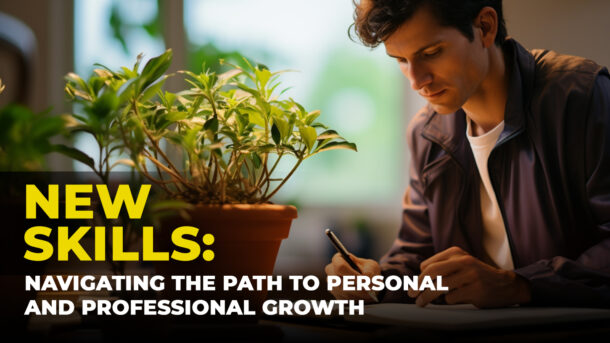In an unexpectedly evolving global, the acquisition of recent talents has come to be greater than just a choice; it’s a necessity. Whether you are aiming to decorate your career potentialities, adapt to technological advancements, or simply improve your private life, growing new talents can open doorways to a global of opportunities. This article delves into the importance of acquiring new capabilities, the forms of capabilities in call for, and the strategies to efficiently research and combine them into your existence.
Table of Contents
- Introduction
- The Importance of Acquiring New Skills
- In-Demand Skills in the Modern Era
- 3.1 Technological Proficiency
- 3.2 Soft Skills: The Human Touch
- 3.3 Creative Intelligence Unleashed
- Navigating the Skill Acquisition Journey
- 4.1 Setting Clear Goals
- 4.2 Choosing the Right Skills
- 4.3 Embracing Continuous Learning
- Methods to Learn New Skills
- 5.1 Online Courses and Tutorials
- 5.2 Workshops and Seminars
- 5.3 Learning Through Experience
- Integrating New Skills: From Practice to Mastery
- 6.1 The Power of Consistency
- 6.2 Learning Communities and Networks
- 6.3 Showcasing Your Skills
- Overcoming Challenges and Staying Motivated
- 7.1 Dealing with Imposter Syndrome
- 7.2 Managing Time and Commitments
- 7.3 Drawing Inspiration from Role Models
- The Transformative Impact of New Skills
- Conclusion
Introduction
In a world where trade is constant, staying relevant requires a dedication to non-stop learning. Embracing new abilities not simplest boosts your self assurance however also complements your adaptability in numerous spheres of life.
The Importance of Acquiring New Skills
The demand for workers with varied skill sets is increasing as the digital world reshapes sectors and economies. Learning new skills has numerous benefits, ranging from enhanced employability to increased cognitive agility.
In-Demand Skills in the Modern Era
3.1 Technological Proficiency
Being technologically literate is vital in an age dominated by technology. Tech skills are the currency of the modern workforce, from coding and data analysis to competency with digital collaboration tools.
3.2 Soft Skills: The Human Touch
While technology is pivotal, soft skills such as communication, empathy, and adaptability retain their significance. These skills are crucial for effective teamwork and leadership in any setting.
3.3 Creative Intelligence Unleashed
The ability to be creative is now highly regarded across industries and is no longer just reserved for artists. In a competitive market, individuals and organizations can stand out by having innovative ideas.
Navigating the Skill Acquisition Journey
4.1 Setting Clear Goals
Defining your objectives is the first step in acquiring new skills. Whether you seek personal growth or professional advancement, clear goals provide direction.
4.2 Choosing the Right Skills
Prioritize skills that align with your interests, strengths, and career aspirations. This ensures that the learning process remains engaging and relevant.
4.3 Embracing Continuous Learning
Learning is not a one-time event; it’s a lifelong journey. Embrace a mindset of continuous learning to stay adaptable in a rapidly changing world.
Methods to Learn New Skills
5.1 Online Courses and Tutorials
The internet offers a treasure trove of online courses and tutorials. Platforms like Coursera, Udemy, and Khan Academy provide convenient and affordable ways to learn new skills.
5.2 Workshops and Seminars
Participating in workshops and seminars fosters interactive learning and networking opportunities. These events provide a hands-on approach to skill development.
5.3 Learning Through Experience
Sometimes, the best way to learn is by doing. Engage in projects, internships, or volunteer work to gain practical experience and refine your skills.
Integrating New Skills: From Practice to Mastery
6.1 The Power of Consistency
Consistency is key to skill mastery. Dedicate regular time to practice and improvement, and you’ll witness remarkable progress over time.
6.2 Learning Communities and Networks
Joining communities of fellow learners and experts can accelerate your skill development. Collaborative learning environments provide support and diverse perspectives.
6.3 Showcasing Your Skills
Don’t shy away from showcasing your newly acquired skills. Build a portfolio, contribute to projects, and share your insights to establish your expertise.
Overcoming Challenges and Staying Motivated
7.1 Dealing with Imposter Syndrome
Many individuals experience imposter syndrome when acquiring new skills. Remember that everyone starts somewhere, and learning is a gradual process.
7.2 Managing Time and Commitments
Balancing skill development with existing commitments requires effective time management. Allocate specific time slots for learning to ensure consistent progress.
7.3 Drawing Inspiration from Role Models
Look up to individuals who have successfully acquired and integrated new skills. Their journeys can provide motivation and valuable insights.
The Transformative Impact of New Skills
New skills have the potential to transform not only your career but also your overall perspective. They empower you to adapt to change and approach challenges with confidence.
Conclusion
In a world of constant change, learning new skills is a superpower that propels you forward. Whether you’re venturing into a new industry or seeking personal growth, the journey of acquiring and integrating new skills is a fulfilling endeavor.
FAQs
Q1: How do I choose the right skill to learn? A1: Consider your interests, strengths, and long-term goals when selecting a skill to learn.
Q2: Can I learn new skills while working a full-time job? A2: Absolutely. Allocate dedicated time for learning and focus on consistency.
Q3: Which skills are highly valued in the remote work era? A3: Skills like digital communication, time management, and self-motivation are vital for remote work.
Q4: How can I stay motivated during the challenging phases of skill acquisition? A4: Break down your goals into smaller milestones and celebrate each achievement along the way.
Q5: Where can I find opportunities to showcase my newly acquired skills? A5: You can contribute to online platforms, collaborate on projects, or even start a blog to showcase your skills to a wider audience.

